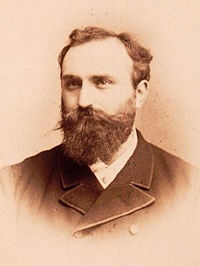
Ernest Chausson (1855–1899) was a French composer whose modest but deeply expressive oeuvre earned him a lasting place among late-19th-century French artists. Born in Paris on January 21, 1855, into a prosperous bourgeois family, he initially followed his father’s wishes by earning a doctorate in law and briefly practicing as a barrister. However, his true calling lay in music. In 1879, he entered the Paris Conservatory to study composition under Jules Massenet and, privately, César Franck.
Chausson’s early style reflected Massenet’s lyricism; from 1886 onward, his music grew more dramatic, shaped by his immersion in Parisian artistic circles and by his fascination with Wagner—sparked by trips to Bayreuth, including attendance at the premiere of Parsifal. Serving as secretary of the Société Nationale de Musique from 1886 until his death, he promoted French music and hosted a celebrated salon that welcomed composers like Debussy, Fauré, Duparc, Albéniz, plus poets and painters such as Mallarmé and Monet.
Though not prolific—only 39 opus-numbered works—Chausson produced several masterful compositions. These include his only symphony, the Symphony in B-flat (Op. 20); the lush, evocative Poème for violin and orchestra (Op. 25); the song-cycle Poème de l’amour et de la mer; the powerful Piano Quartet (Op. 30); and his opera Le roi Arthus.
Chausson died tragically young—at age 44—on June 10, 1899, in Limay, when his bicycle crashed into a brick wall. His music, marked by its refined chromaticism, introspective lyricism, and a stylistic bridge between Romanticism and nascent Impressionism, continues to captivate performers and audiences alike.
We are on a mission to bring the highest quality musical experiences to all corners of our community.
Sign up to join our newsletter and receive updates on upcoming events and exclusive discounts.